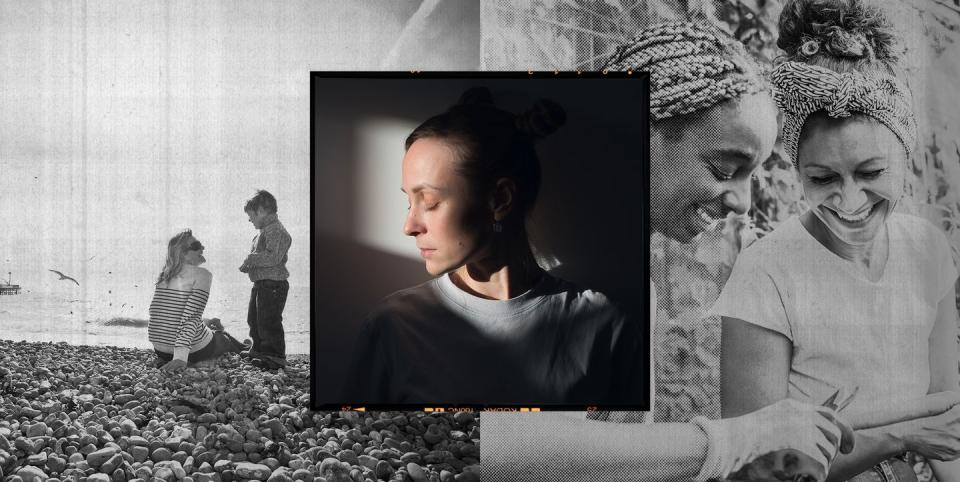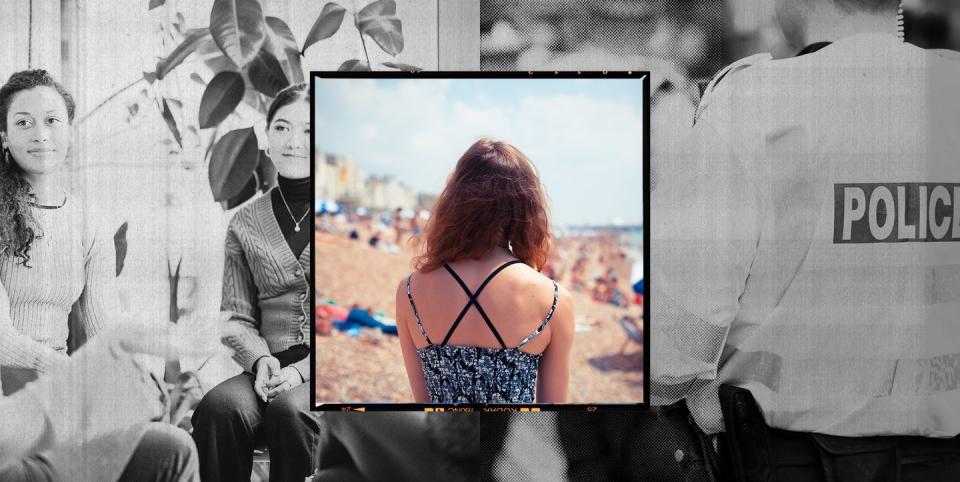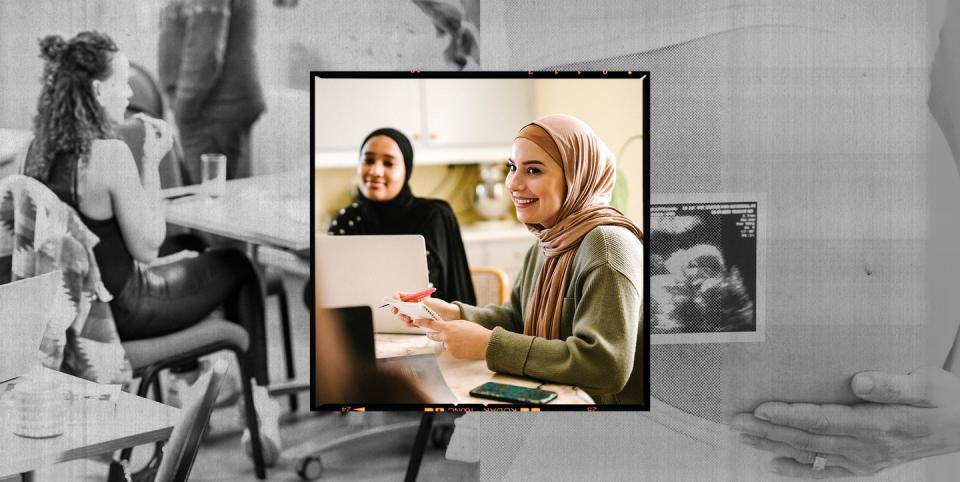"I'd reached the point of no return": Inside the centre bringing women back from the brink

Thousands walk past every day without noticing it or knowing anything about the lives being transformed inside. Nestled behind the sunflower-hued door of a Georgian terraced house, on a busy Brighton street, the Brighton’s Women Centre (largely known by its acronym the ‘BWC’) – is home to those facing unique difficulties, in particular those at risk of reoffending.
The need for a place like this is great: statistics show that compared to men, women who receive a custodial sentence (prison time) are more likely to be complex and vulnerable individuals, who’ve experienced trauma and abuse themselves – and while 95% of male prisoners’ children remain in their own homes when their father is incarcerated, the same can be said for only 5% of children whose mothers are jailed. Following the deaths of two babies in prisons between 2019 and 2020, campaigners are now also petitioning to stop pregnant people from being jailed at all – something the Sentencing Council recently announced they're re-examining.
One woman who knows all about the heartache of spending time in a cell whilst pregnant is Hayley*, an evidently caring and straight-talking 43-year-old mother of five, who has been engaging with BWC for six years.
“I’d reached the point of no return when I first came here,” she tells me, as we sit in a quiet meeting room in the centre’s attic, leaflets about the help on offer scattered across a nearby table. “My life was a mess, a shambles really.” Hayley, like many women who’ve been to prison, has dealt with addiction issues, abusive relationships, and unstable housing, all of which contributed to her committing an offence and serving time whilst expecting. When she left HMP Bronzefield six years ago, Hayley describes herself as ‘broken’.
“I’d started to wake up when I was arrested, but when I came here, it was the first time I really felt I was being listened to and that there was hope of change. I was pregnant again, with twins, and I’d already had three daughters taken off me. Was I really gonna go through that again?” she shares, reflecting on how far she’s come since first walking through that sunshine yellow door. “When you go through the justice system, you meet a lot of people and go to a lot of places. You meet probation officers, and they’ve got your file in front of them… you instantly feel judged.”

She adds, “You’re scared to be totally honest about your situation in case it comes back to bite you later on. People get scared they’ll lose their children if they ask for help [with a substance abuse issue]. You feel you’re drowning. But it’s not like that in BWC, it’s a women’s only space that has a different energy. There was no chaos in the building, it was just calm.”
Hayley was first referred to BWC under court orders via her probation officer following a pre-sentence report, which she says is what ‘saved’ her from another stretch in prison. She now also credits her case worker, Marion, for also ‘drip feeding’ her information about the signs of coercive control, narcissism and abuse too, during their chats over cups of tea. “I started to feel a bit empowered and could recognise behaviour that wasn’t right for the first time.”
Unlike a refuge or shelter (accommodation for those fleeing abuse), the function of a women’s centre can sometimes be confused – which is understandable, given that the likes of BWC seem to… do it all, for anyone in need of help. As well as having staff on hand for practicalities such as housing issues, financial problems, mental health support (counselling and psychotherapy is available) and food poverty (the latter being the service that’s seen the biggest increase in demand over the past year), women’s centres provide a safe space to talk – which can ultimately be the biggest game-changer for many. There’s also a cheerful nursery on site, Toy Box, so that mothers can attend appointments without fretting about childcare.
All of which is why the newly announced £15 million government cash injection into 40 women’s charities and centres in England and Wales, like the BWC, that support those at risk of reoffending, is so crucial. But is it enough, given that a recent Women In Prison report found nearly half of all women’s centres are concerned about their survival? What else can be done to stop women – and mothers in particular – from going to jail, and tearing apart families in the process, traumatising a new generation? Why are 3,219 women ending up in prison each year in the first place, with most having committed a non-violent, low-level offence?
Victims before perpetrators
“We often say that women who’ve gone to prison were victims before they were perpetrators,” says Damian Hinds, Minister for Prisons, Parole and Probation, who joins me at BWC. “We know female offending is typically driven by factors such as drug and alcohol abuse, domestic violence, and mental health issues. Around 60% of women in prison have experienced domestic abuse and about half have some kind of drug problem, so we need to tackle those underlying issues with earlier intervention and better support, to stop the cycle of offending.”
He praises the Female Offender Strategy that began in 2018, with the aim of tackling the root causes of female offending and reducing prison numbers (Hinds’ team also shares that between June 2018 – June 2022 the number of women sentenced to immediate custody fell by 37%).
However, whilst news of the funding is a welcome step in the right direction "that provides a much-needed respite for organisations working tirelessly to meet the needs of at-risk women, or those in contact with the criminal justice system”, there's still a long way to go, says Sonya Ruparel, the Chief Executive of Women In Prison (a charity that has supported women in the criminal justice system for 40 years). Their work sees them have a presence inside prisons, in the community and ‘through the prison gate’ as they help women to resettle in their communities.
"The money is providing a temporary solution to a long-term problem, and this £15m available pales into insignificance when compared, for example, with the £200m the government are investing in an extra 500 prison places for women," she explains. "Despite the government’s commitment to reducing the women’s prison population, they are projecting it will rise by up to 35% in the next three years.
"Without real investment in services that support women to address the root causes of crime such as domestic violence and abuse, debt and homelessness women will continue to be unnecessarily swept into the criminal justice system."
Female inmates, the majority of whom have been convicted of fraud (14%) or shoplifting (19%), also have to grapple with being incarcerated by a system designed with men in mind, and it is estimated that women sent to prison are seven times more likely to self-harm than men. Each year, 17,000 children are impacted by maternal imprisonment too.
Helping women to break the cycle of trauma is something that Lisa Dando, Director at BWC, and all her staff, are passionate about. They explain that a ‘trauma-informed’ approach is key when dealing with any woman living with multiple disadvantages [something that can be lacking during arrests, for instance, if officers haven’t been specially trained] and that a shortage of decent emergency accommodation sees women who’ve recently left prison instantly set up to fail.
Too many are housed far from home – away from their support networks that help them to stay sober and happy – and are forced into mixed gender living situations, with shared bathrooms, toilets, and broken locks. All of which see their fight or flight responses fire up, particularly if they’ve been victims of domestic abuse or sexual violence. It’s much harder to stay sober when you’re scared and lonely.
The UK also continues to put pregnant women in prison, when other countries don’t. “Women give birth in prison here,” Dando adds. “I don't understand why the children are being punished for a crime their mothers have committed.”
Jailing pregnant women is something that campaigners have long fought to put an end to, and have recently seen a chink of light with, as the Sentencing Council recently announced plans to consult on new guidelines surrounding pregnancy in prison this autumn. "We are planning to consult on a new mitigating factor relating to pregnancy in sentencing guidelines as part of our 2023/24 miscellaneous amendments consultation," a spokesperson said [via ELLE UK]. "This consultation will be published in September this year."

“The prison system is damaging in so many different ways and I'm also not convinced that the rehabilitation work that takes place inside, especially for women on short term sentences, which the majority are, has enough time to really make a difference,” Dando adds, “It seems illogical [to break families up in this way] when there are alternatives, like women’s centres and non-custodial sentences, that are proven to work.”
The BWC CEO, of course, caveats that this does not mean she supports people who’ve committed violent or very serious crimes going without punishment.
It’s a sentiment that Hinds seemed to agree with during our interview too, along with the need for better trauma support training to be instilled across the justice system as a whole. “Trauma-informed services and spaces for these women are vital,” agrees Marion Taylor, Manager of the Inspire project at BWC, who has worked with Hayley. “It’s about working with women in a way that recognises they have trauma in their backgrounds, that shapes the way they’ve developed and react to certain things.” Consistency is also key; BWC is able to offer twelve sessions with a therapist, whereas the NHS offering typically hovers at around six to eight.
Part of the newly announced funding, of which BWC has received £761,280, will also be spent on creating better links between women’s centres and the police, which (as suggested by the Casey review) is rife with misogyny, racism and homophobia. “[The review] is a big part of why we wanted to form a partnership with the police, to divert women away from contact with them if possible,” Dando explains. “We want to step in early and provide a different model of support, to protect women from having to experience being in a police cell or the damaging effects of a service that is struggling. We’d like to bring a different view and educate the police on a new way of working.”
In terms of feeling the impact of previous government cuts to services, Dando diplomatically says that since she “joined fifteen years ago, it’s been peaks and troughs” and that currently, the centre looks set to be financially ‘safe’ for the next two years. She highlights the financial gains of custodial sentences being a last resort too, pointing out that incarceration costs around £42,000 per inmate compared with a community sentence coming in at around £2,000. Around 87% of women given a non-custodial sentence do not go on to reoffend either. Dando adds, “And really, we’re all at risk of needing a women’s centre if our circumstances suddenly change.”
When asked by Cosmopolitan UK as to whether the new £15 million funding allocation is enough for women’s services, Minister Hinds said he feels it’s a “substantial investment” and that the scheme will reduce the £18 billion overall cost of reoffending for the taxpayer. “Female offenders also benefit from other support the justice and health systems provide, like the Probation Service and Government’s £3 billion 10-year drugs strategy investment.”
Coming back from darkness
Someone who is a prime example of a non-custodial sentence working is Sarah*, a 60-year-old animal lover who explains that she snapped after a long-running dispute with her neighbour escalated during lockdown. The neighbour, she says, made an illegal roof garden on their building, that Sarah repeatedly said wasn’t safe – and her point was proven when a dog later fell off and was injured. Later on, whilst in the vet’s surgery, an argument between the neighbours grew heated and Sarah admits that she pulled her neighbour’s hair.
Her situation, Sarah points out, is a prime example of circumstances changing in an instant – and to her credit, she repeatedly acknowledges that she shouldn’t have become physical in that scenario. “I do sometimes wake in the night and think how could this happened? I pulled her hair. Yet I've been punched in the past, and it never goes to court. It was all just blown completely out of proportion… I used to work for probation, I spent five years working with one parent families.”
Ultimately, after sleepless nights spent imagining how she’d survive in prison, Sarah was given a non-custodial sentence of community service work, which she completed in a PDSA charity shop, “I was put in a position in court, where if I opened my mouth and tried to stand up for myself, I knew I would go to prison,” she reflects. “So I stayed quiet and left it to my solicitor, who managed to reduce my sentence down to 50 hours of non-custodial work.” Alongside her sentence, Sarah was also issued an eviction order, which is what led her to BWC to seek help with housing.

“It was last chance saloon,” she shares. “I’d tried to access other services but found they weren’t able to move fast enough for me. It had reached the stage where my family were exhausted with it all too. My kids are older – my daughter is a doctor and my son's a respected musician – they came with me to court, but they didn’t have the facilities to help me, whereas women’s centres do. Even things like utility bills, I've brought them here as I just couldn’t have handled them alone.”
Now, Sarah is in a much better space – both mentally and physically – having found alternative accommodation with BWC’s support, and once her 50 hours in the shop were up, she decided to stay on as she found it good for her confidence and sticking to a routine.
Hayley now says she’s now able to be there for all of her children and is clean and sober. She is also single, having broken free of her pattern of repeatedly entering into abusive relationships, and tells me she’s teaching her 17-year-old daughter to spot the red flags that she missed early on. “My kids have seen a lot of things and experienced a lot of trauma, they've seen me beaten up, drug dealers come through the doors, windows being smashed… But now it's like, mum's not that person anymore,” she says. “They can see I'm not running to men, or looking for a man to fix me, or putting up with being spoken to in a certain way. I can finally set the right example.”
For now, it sounds as though the likes of BWC and the forty other women’s centres that have received funding at least have a little space to breathe – but is allowing them a moment to pause and catch their breath really enough? Especially given that new stats show one in five people in the UK are living in poverty right now, and that debt and homelessness are precursors to potentially committing an offence. Is it right that women’s centres have had to fight so hard – and wait so long – to receive adequate financial support in the first place, given the incomparable work they’re doing? And whilst these forty centres can feel short-term relief, plenty of other incredible organisations around the UK are still struggling. Let’s hope this is only the beginning of the recognition, and that the pressure all women’s centres are feeling will be eased on a more permanent basis in the near future.
*Name has been changed
You can donate to Brighton Women's Centre here and Bankuet, the food bank association that work alongside the BWC, here
You Might Also Like

 Yahoo Sports
Yahoo Sports 